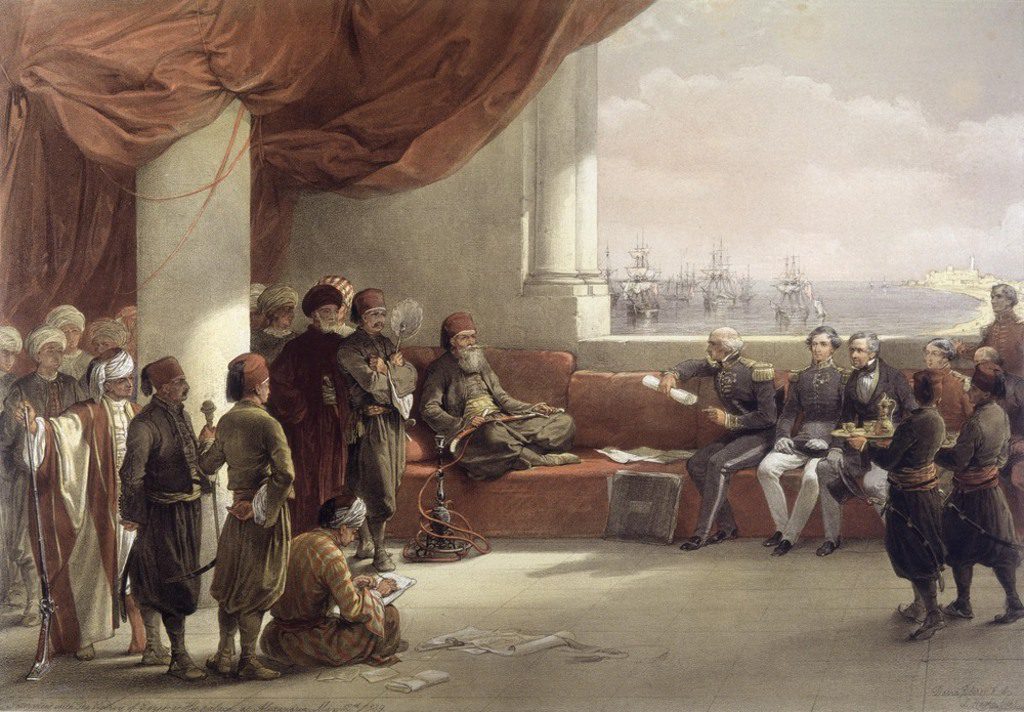
In September 1840, Lord John Russell, a British politician and twice prime minister, wrote a letter to his colleague, Lord Holland. His words could have been written last week, since they deal with a crisis in Syria.
“Affairs in the East seem to be moving to a crisis and I trust all parties will see that the old Pacha ought not to be allowed to set the world on fire, whatever he may do in Syria or even in Mesopotamia.”
The ‘old Pacha’ he was referring to was Muhammad Ali, the ruler of Egypt, who had come into open conflict with the European powers, with the exception of France which had sided with him, so he believed. This conflict, which came to a head in the summer and autumn of 1840, would severely curtail Egypt’s power, cement Britain’s position in the region and have repercussions that are felt even today.
It all started in the early 19th century, when the Ottoman government, until then the main power broker in the Mediterranean, was in decline. This left a vacuum for ambitious military and political leaders to step in and fill. One of these was Muhammad Ali, also known as Mehmet Ali. He was an Ottoman commander of Albanian descent, who, in 1801, was dispatched to Egypt, then a semiautonomous province of the Ottoman Empire and occupied by Napoleon Bonaparte, to oust the French.
But Muhammad Ali was determined to follow his own path. By building alliances with local leaders and ruthlessly going after his political and military opponents, he was gradually able to take control of Egypt and consolidate his power.
During the first decades of the 19th century, he set about modernizing the Egyptian state. He centralized the economy and expropriated large tracts of agricultural land. The state was thus able to regulate the crops that were grown, especially cotton, which promised high cash returns. The revenues this generated were used to build a strong military and a national bureaucracy. Egyptian engineers were sent abroad to learn how to establish and run modern factories according to the European model. The nascent Egyptian industry that emerged produced tools, machines and weapons, of which the Egyptian military was one of the largest recipients.
The Ottoman government in Constantinople was not able to stop Muhammad Ali’s ascent. He considered the Ottoman Empire to be doomed and was determined to establish an independent hereditary kingdom that would be the natural successor of the Ottomans. However, he was also a cautious man who did not want to antagonize the European powers and wanted to avoid the collapse of the Ottoman Empire.
He initially supported the Ottoman sultan, conducting military campaigns on the Arabian Peninsula on his behalf. In 1827, he helped to crush a Greek rebellion but suffered heavy naval losses against an allied fleet of British, French and Russian vessels that had come to Greece’s aid.
He asked the sultan to give him Syria (present-day Lebanon, Syria and parts of Palestine) as compensation for these losses. Syria was an attractive asset, acting as a natural buffer between the territory controlled by Egypt and the Ottoman Empire. It also offered trade routes and an internal market for Egyptian goods.
The sultan refused Muhammad Ali’s request. Not one to take no for an answer, Ali invaded Syria in October 1831. From there, the Egyptian army marched into Anatolia and defeated the Ottoman army in December 1832 at the Battle of Konya. A subsequent peace treaty, brokered by the alarmed European powers, accepted that Syria was now under Egyptian rule.
A few years later, the Ottomans tried to retake Syria but once again suffered a devastating military defeat at the Battle of Nezib. Hostilities continued and, in June 1840, the entire Ottoman navy defected to Egypt. Muhammad Ali now controlled large parts of present-day Egypt, Sudan, the Arabian Peninsula, Palestine, Syria and Lebanon, and it looked like Egypt was destined to take over the reins of regional power.
Concerned about the impact an Ottoman collapse would have on Europe, this was the moment the European powers decided to intervene. Lord Palmerston, who was in charge of British foreign policy, considered Muhammad Ali “as great a tyrant and aggressor as ever made a people wretched”. More importantly, Britain was anxious not to have a new regional power take over the territories and naval routes that lay between it and its colonies in the Far East, notably India.
On 15 July 1840, Great Britain, Austria, Prussia and Russia signed the London Convention. This granted Muhammad Ali and his descendants permanent control over Egypt if he withdrew his forces from all occupied areas in Syria, Adan, the holy cities in Hijaz and the island of Crete and agreed not secede from the Ottoman Empire. He also had to return the Ottoman fleet that had defected.
Backed by France, Muhammad Ali refused to comply with the demands of the convention. For several weeks in the summer of 1840, there were fears that Britain and France might even go to war with each other over the matter. But the French king, who was a staunch opponent of war, intervened and that autumn, Ali found himself facing the European powers on his own in a short but brutal military campaign that left him soundly defeated.
In November 1840, he was forced to accept the terms of the convention. His dreams of building an empire that would be a worthy successor to the Ottoman Empire had been shattered. One can only imagine what the Middle East and the Arabian Peninsula would have looked like if Muhammad Ali, with all his cunning, shrewdness and insight, had succeeded in playing the strong hand he had held at the start of that year.

